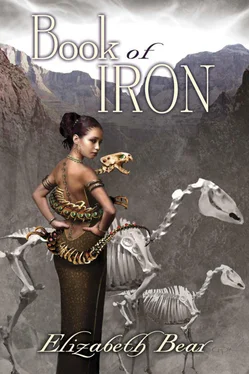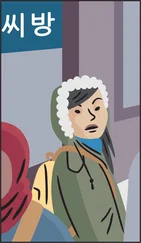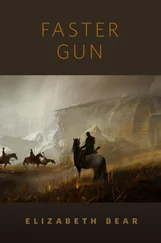
Elizabeth Bear
BOOK OF IRON


One
Bijou bolted alone through the marble and lapis corridors of the Bey’s palace like a messenger-boy fearing the back of his master’s hand. The red-black springs of her curls bounced against her skull with each step. Her Northern shoes flapped in her hand; she ran barefoot, bare soles sure on checkerboard floors that had warmed already with the heat of the day. Behind her, something dry rattled as if in pursuit: Ambrosias, one of her artifices.
She didn’t think Prince Salih would allow the photograph to be taken without her. Kaulas, however, would consider it teaching her a lesson.
Servants, ladies, and functionaries stepped aside to clear her path, drawing their robes against the walls. Whatever their rank, they knew it wisest to let a running Wizard pass.
They were dressed sensibly for Messaline’s brutal summer. Bijou sweated already inside her black trousered suit, the height of fashion in clammy Vyšehrad but a ridiculous vanity in Messaline. But not a vanity Bijou was prepared to sacrifice today.
Kapikulu —scimitar-wielding door-slaves, sworn to the service of the martial god Vajhir—stood like pillars to either side of the corridor’s end. Like pillars, that is, except for their coats the color of a sun-bleached sky. They also made no move to stop her, but in their case immobility was informed by confidence rather than caution. In fact, one reached out impassively and pushed open the pierced ivory door before Bijou hit it.
She let her steps slow so momentum carried her into the room beyond and onto its thick-laid carpets where three men waited.
Kaulas the Necromancer—handsome and hollow-cheeked and pale as mutton-fat, raw-boned in his height—stood against an inlaid cabinet, irritably smoking a thin brown cigarette. Each time his long rectangular hand lifted to his mouth, the bones of his wrist pulled free of his shirt-cuff and the sleeve of his suit coat. Bijou met his gaze and felt a chill like iron up her spine, a kind of hard and pleasant independence born in equal parts of her dislike for and her attraction to the man. It was easier not to like him. It kept her from making the mistake of too much vulnerability.
Beside him stood Prince Salih, the Bey’s second son, who was clothed neck to sandals in a linen dishdasha of exquisite cut. In any other company, the prince might have seemed tall: next to Kaulas he was merely not dwarfed. He was a scimitar of a man, and the architecture of his face made him seem older than his years—or rather, timeless. Where Kaulas seemed tense, the prince gave off the relaxed well-being of a cat who had commandeered the best sunbeam. But Bijou knew that like that cat, he had claws: several firearms and a curved sword hung about his body in plain sight. More hung concealed in the flowing robes.
He gave Bijou a sleepy smile, crooking an arm to sweep her into the orbit of Kaulas and himself.
The third man bent behind the massive outline of a camera, fussing with fragile glass plates that must at all costs be protected from light. He was a pet of the prince’s, and Bijou could not remember his name.
“Finally,” Kaulas said, flicking the ash from his cigarette tip into a ceramic teacup rimmed at the edge with gold.
Bijou drew to a halt and drew herself up. The clattering behind her subsided as her familiar beast caught up, reaching the edge of the rug.
“I was busy,” she said. “And I’m here now.”
She clucked to Ambrosias without looking back at it. Ambrosias was an animate, bejeweled skeleton made in the design of an antediluvian centipede. At her summons, it swarmed up her body, the sharp tips of hundreds of feet catching at the fabric of her jacket. Finger-cymbals contained within its structure made a silvery shiver of sound as it draped itself around her neck, light catching on the rough-tumbled surfaces of jasper and agate set in sand-cast copper along its length.
Ambrosias was made of the vertebrae of horses and the rib bones of cats, articulated to a ferret skull. It stretched three canes in length. When Bijou turned, it twisted around her body like a spiral staircase. She composed herself in a posture that might not look too stiff, even though she must hold it for as long as it took the photograph to develop.
“There,” she said. “I’m ready. Gentlemen?”
Ambrosias hated the flash. It clicked in distress, but held still because Bijou asked it to. Bijou was less irritated, but she too was glad when they finished and the prince sent the photographer on his way. She disentangled herself from Ambrosias, stretching the cricks of immobility from her spine. She let the bone centipede rattle to the floor like a chain of beads, and was about to suggest food when more running footsteps interrupted them.
These were the strides of a messenger, and one seemingly on urgent business. His feet slapped across stone to the carpets, where they were silenced. He ducked his head before Prince Salih, dropping to a knee.
“Salih Beyzade,” he said. “There are foreign sorcerers to see you.”
The prince’s reputation meant a certain number of people with complicated problems sought his attention, sometimes unannounced. Because those problems were often the sort that no one but the prince and his Wizardly associates could assist with, he made himself considerably more accessible to the people than his father or older brother.
The people stood in enough awe of the prince—not to mention Bijou and Kaulas—that few of his supplicants abused the privilege. Most people considered it unhealthy to come to the attention of a Necromancer—even one who, under the prince’s auspices, had devoted his tenure in Messaline to errantry and the noble deeds of an adventurer.
If foreigners had come in search of the prince, the odds were very good that something was very wrong.
Excellent. Bijou was in the mood for an adventure.
Stiffly, she permitted Kaulas to take her elbow and guide her, following the prince’s long strides, to an audience chamber in the outer circle of the palace. The chamber was warded with sigils of lead and gold worked into walls and door, and glass spell-catchers hung in each narrow window, sparkling in the slanted light.
Two women and a man waited there, all three as pale of skin as Kaulas the Necromancer himself. Bijou felt the possessive pressure of his hand against the small of her back. She didn’t think he tensed with recognition.
Foreigners, indeed. Foreign Wizards, if Bijou was any judge. And apparently the door guards had suspected the same, if they had ushered the three in here. Their stance told her more: they covered one another’s backs and blind spots in much the same way that Bijou, Kaulas, and the prince watched out for each other. Adventurers, then—which explained what they were doing so far from home. While reaching Messaline from the North was no longer a matter of weeks or months of travel by ship or train, it still wasn’t the sort of journey anyone would undertake lightly—and by their crumpled outfits and their cramped, stiff expressions, all three of these had been traveling for some time.
Читать дальше














